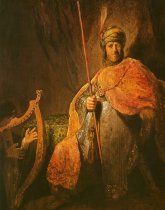|
 Elsewhere in Samuel, an evil spirit from God is talked about which takes possession of Saul from time to time: "Behold now, an evil spirit from God is tormenting you." (1 Samuel 16:15) and two chapters later: "And on the morrow an evil spirit from God rushed upon Saul, and he raved within his house." (1 Samuel 18: 10). Elsewhere in Samuel, an evil spirit from God is talked about which takes possession of Saul from time to time: "Behold now, an evil spirit from God is tormenting you." (1 Samuel 16:15) and two chapters later: "And on the morrow an evil spirit from God rushed upon Saul, and he raved within his house." (1 Samuel 18: 10).
This "raving" of Saul was the reason why the young David, who could play the lyre more beautifully than anyone else, was summoned to court. Saul appears to have reacted positively to "music therapy": "And whenever the evil spirit from God was upon Saul, David took the lyre and played it with his hand; so Saul was refreshed, and was well, and the evil spirit departed from him." (1 Samuel, 16:23).
|
|
It is to be assumed that David experienced several of Saul's uncontrolled violent outbreaks at close hand. Perhaps it was this first-hand knowledge which later, when he was fleeing from Saul, having fallen into disfavour, made David fake an epileptic seizure in order to make his enemies think that he was mad:
"So he changed his behaviour before them, and feigned himself mad in their hands, and made marks on the doors of the gate, and let his spittle run down his beard."
This is probably the first time the symptoms of a simulated seizure were ever written down - and King Saul's epileptic seizures were possibly the "model" for this hysterical seizure. 
|


 Elsewhere in Samuel, an evil spirit from God is talked about which takes possession of Saul from time to time: "Behold now, an evil spirit from God is tormenting you." (1 Samuel 16:15) and two chapters later: "And on the morrow an evil spirit from God rushed upon Saul, and he raved within his house." (1 Samuel 18: 10).
Elsewhere in Samuel, an evil spirit from God is talked about which takes possession of Saul from time to time: "Behold now, an evil spirit from God is tormenting you." (1 Samuel 16:15) and two chapters later: "And on the morrow an evil spirit from God rushed upon Saul, and he raved within his house." (1 Samuel 18: 10).

